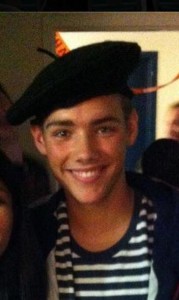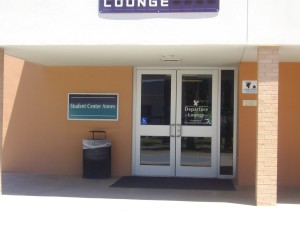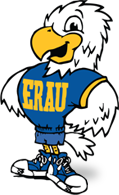Hey Everybody,
As promised, the following entry will be about the Dual Degree Program: how I became interested, details and benefits of the program, and the application and preparation process.
First things first, let me say that I decided on a career much earlier than most of my peers. Even now, at age 20, some of them are not 100 percent sure of what they would like to do in the future. When I was about 14 years old, my teacher assigned my class a research paper about an occupation we were interested in. I ran through various careers I was intrigued by when I was younger, artist, architect, and oceanographer, but eventually decided that the topic of my paper should be aerospace engineering.
I came up with the idea while watching Star Trek with my family one evening-super inventive of me, I know. I was fascinated with how the engineers knew the ins and outs of every piece of equipment on Enterprise. They could push the engines to go faster than ever before, improvise a communication device, and were able to repair every system on the ship. They were intelligent, inventive, and an integral part of the crew. I also loved how Enterprise traveled to other worlds and met different species and were able to communicate successfully and learn about their culture. I saw aerospace engineering as the perfect way to learn about all the engineering disciplines while being able to travel and work with people from other countries.
Since that revelation, I have done everything I could to make that dream a reality. During high school, I took advanced classes in math, science, and English. I also participated in a robotics club that went to a state competition for two years. I knew that these areas of my education needed to be strong in order for me to become a good applicant for top colleges. In addition, I also learned that the European Space Agency had headquarters in Paris, France. I thought that the ESA would be more likely to hire somebody who had studied French to help with the language barrier. As a result, I studied French for three years and traveled to the country during my senior year of high school. When I came to Embry-Riddle my freshman year, I sought out the Study Abroad table during the student activities fair to see what programs were offered. My favorite program by far was the Dual Degree Program.
The Dual Degree Program is an agreement that Embry-Riddle has with EPF, a well-known school in France, where students are able to earn degrees from both schools. The idea is that aerospace engineering students who participate in the program, which starts in their junior year, will be able to earn at least a Bachelor’s Degree from ERAU and a diplôme, a diploma, from EPF. Schooling at EPF starts during junior year with students returning to ERAU during their senior year to complete their Bachelor’s Degree. Then students travel back to France for their “Fin d’Etudes” or end of studies. From there, students have the option to either receive an internship through EPF or return to ERAU for their Master’s Degree.
Since all the classes taught by EPF will be in French, students will become bilingual and fully immersed in French and European culture. It is thought that bilingual individuals will be more likely to be hired due to globalization of the aerospace industry and international companies who have offices in both the United States and in other countries overseas. Furthermore, because both schools have a different approach to learning and teaching, students will have versatile problem-solving skills and be better equipped for engineering jobs. Essentially, the Dual Degrees allows students to earn two degrees that will be both recognized in the United States and in other countries while living in a foreign country, learning a new language, and becoming fully immersed in a new culture. Naturally, the minute I learned about this program, I was ecstatic and could not apply soon enough.
Eligibility requirements for the Dual Degree Program as stated on the main website, located here, are:
• Have sophomore status, complete all Freshman and Sophomore courses listed in the catalog for you degree program, and a CGPA of at least 3.0 at the time of application
• Write a one-page essay in French describing out the program will help you to achieve your goals
• A preferred completion of HU153 French II or be able to demonstrate proficiency in French
The application for the Dual Degree Program is located here and is due during the third week in February. The list of documents required for the application process is:
• The application itself-it asks for a lot of basic information as well as scholarships received, extracurricular activities, practical experience, advisor consent, liability forms, etc.
• A sealed copy of official transcripts-these can be obtained from Records and Registration located above the Departure Lounge near the Mailroom of the Student Center.
• Two letters of recommendation, one must be from a past or current professor
• A one page, double spaced essay in English describing why you would like to study abroad and what you expect to gain from this experience
• Two passport sized photos-you can get these at Walgreens, located just off Beville Road
• A copy of your most recent passport-it must be valid for at least six months after you return to the U.S., if you do not have one, information about passports can be found here.
• A résumé in French-also known as a CV, please not that this is not simply a regular résumé translated into French. A CV has different content and a different layout than a résumé.
• One page, double spaced essay in French describing why you would like to participate in the Dual Degree Program
• An EPF Program of Studies Form-essentially how ERAU requirements are filled by EPF’s courses
• A copy of your travel itinerary-due no later than one month prior to departure
One of the best ways to make sure that your application contains French that is grammatically correct is to ask a friend who knows the language to look over your application. I was fortunate to have a friend, Bryan, who actually grew up in France and was kind enough to help me with my application. Even though I took three years of French in high school, my skills were very rusty and I had to look up a lot of the vocabulary words on a website called, wordreference.com, which works much better than Google Translate.

My friend, Bryan, helped me with the French portions of my application. In this picture, he is wearing his Halloween costume.
Once student have been accepted by the Study Abroad Office at ERAU, they must apply to the summer language intensive program held by EPF, information about the program is here. The Programme enables students to learn French before they take regular classes during the school year. In addition to learning vocabulary and grammar, students are also introduced to French culture and are given ample time to explore Paris and the surrounding areas.
While students are applying to the Programme, they also need to apply for a long-term student visa. Information about long stay visas can be found here on the French Consulate in Miami’s website. Unfortunately, in order to apply for a French visa, students need to physically visit the consulate in Miami. Luckily, I was able to drive there last week with friends, so we made the day of it and visited the beach and saw the sights.
All that is left for me is the waiting game. I should receive my student long-term visa later this week. In between packing and getting all the logistics figured out, I have been practicing French. I have been using a program called Mango Languages. Embry-Riddle provides this program on ERNIE. Probably one of the most helpful parts of the program is that every word and part of speech is color coded to match the English translation. In addition, as each word is highlighted, a box pops up with how to pronounce each word phonetically. The program can get repetitive, but it’s supposed to in order to maximum retention of words. Mostly, I am using Mango for review and am on lesson 41. It is my goal to finish the entire program before leaving for France on June 26.
Until Next Time,
Brenna





